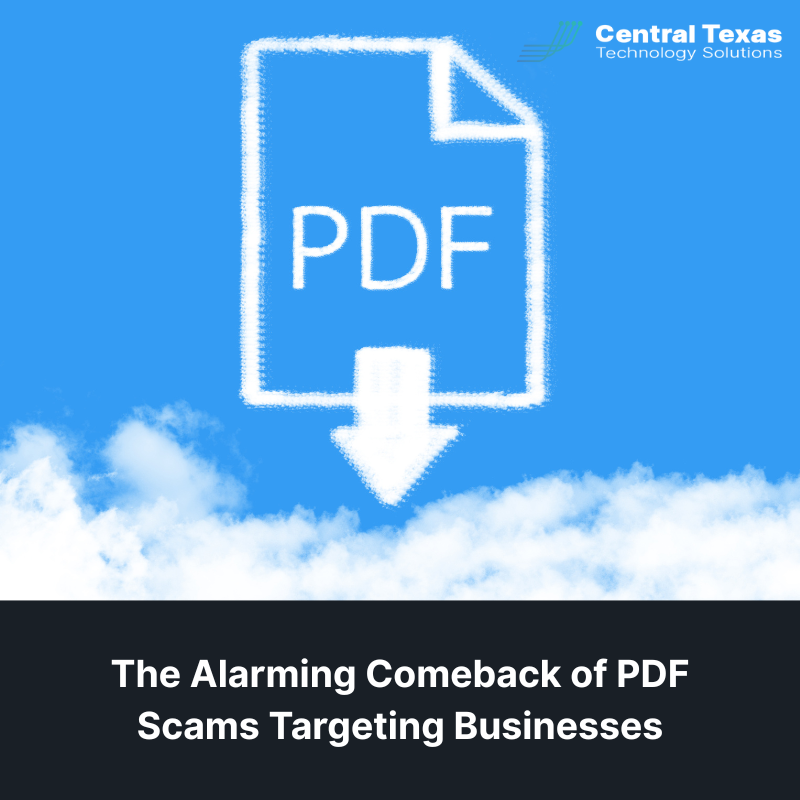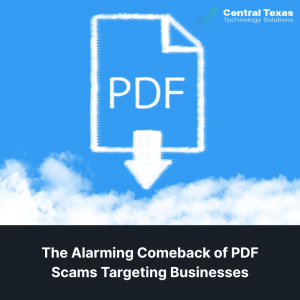
 If you’ve received an email with a PDF attachment claiming there’s an issue with your account and urging you to call a support number, you are not alone. A new wave of PDF scams is hitting inboxes across the country, and this time the bait is more convincing than ever. Instead of asking you to click on a suspicious link, these scams lure you into making a phone call that feels safe, but can quickly compromise your business.
If you’ve received an email with a PDF attachment claiming there’s an issue with your account and urging you to call a support number, you are not alone. A new wave of PDF scams is hitting inboxes across the country, and this time the bait is more convincing than ever. Instead of asking you to click on a suspicious link, these scams lure you into making a phone call that feels safe, but can quickly compromise your business.
What Makes PDF Scams Different
Between May and June 2025, cybersecurity researchers observed a sharp rise in phishing attempts designed to trick business professionals into making a call rather than clicking a link. These messages often appear to come from well-known companies like Microsoft, Adobe, or DocuSign.
Inside the attached PDF, the message warns of a pending transaction or subscription renewal issue and provides a phone number to “resolve” the problem. On the surface, nothing seems unusual—you’re just making a call, not clicking anything questionable. That sense of safety is exactly what cybercriminals are exploiting.
How Callback Phishing Works
This technique, known as callback phishing, preys on the advice that security experts have long given: “Call to verify if you’re unsure about an email.” Criminals are turning that advice against businesses.
Here’s the process:
- A fake notification arrives in your inbox with a PDF attached.
- The PDF looks official, branded with logos from trusted companies.
- The document tells you to call a support number to cancel or verify a transaction.
- Once you call, a scammer posing as a customer service representative answers.
- The fake agent asks for sensitive information, such as account credentials or payment details, or convinces you to install software that gives them access to your system.
Instead of protecting your business, that phone call opens the door to a serious security breach.
Why PDF Scams Are So Dangerous
Unlike traditional phishing, these scams don’t rely on malicious links or infected attachments. The PDF itself may be harmless, but it’s designed to manipulate behavior and create urgency.
Criminals use:
- Brand impersonation to gain instant credibility.
- Professional-sounding representatives to put victims at ease.
- Urgency tactics around renewals, billing, or account suspensions to prompt quick action.
For busy professionals handling dozens of emails a day, it’s easy to see how one wrong call could expose critical business data.
Protecting Your Business from PDF Scams
Awareness and preparation are your best defenses. Business leaders can reduce their risk by implementing proactive safeguards:
- Be cautious with PDFs from unknown senders. If an attachment includes a phone number, treat it with suspicion.
- Verify contact details directly. Visit the company’s official website instead of trusting numbers provided in unsolicited documents.
- Train employees to recognize phishing tactics. Regular awareness training reduces the risk of human error.
- Invest in advanced security tools. Email security solutions can flag suspicious messages and scan attachments before they reach your team.
- Create a response plan. Employees should know exactly who to contact internally if they receive a suspicious email or PDF.
Cybercriminals are counting on businesses to let their guard down. Don’t give them the opportunity.
Why Businesses in Austin Choose CTTS
At CTTS, we help organizations in Healthcare, Legal, Professional Services, Construction, Manufacturing, and Nonprofits stay ahead of evolving threats. Our cybersecurity experts monitor the latest attack trends and provide layered defenses that protect your employees, your systems, and your reputation.
When PDF scams or other phishing tactics strike, you need a partner who knows how to respond quickly and keep your operations running. CTTS delivers proactive monitoring, advanced email security, and ongoing employee training—helping you outsmart attackers before they get a foothold.
FAQ: PDF Scams and Your Business
1. Are PDF scams only targeting large companies?
No. Small and mid-sized businesses are often the preferred targets because they typically have fewer security measures in place compared to large enterprises.
2. Can a PDF scam infect my computer just by opening the file?
In most cases, these PDFs don’t contain malware. The real threat comes from calling the fake support number and sharing sensitive information. However, opening unknown attachments is always risky.
3. What should I do if an employee falls for a PDF scam?
Immediately disconnect the affected device from the network, notify your IT team, and reset any compromised accounts. Partnering with a managed IT service provider like CTTS ensures fast containment and recovery.
Contact CTTS today for IT support and managed services in Austin, TX. Let us handle your IT so you can focus on growing your business. Visit CTTSonline.com or call us at (512) 388-5559 to get started!
